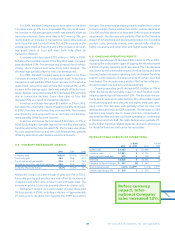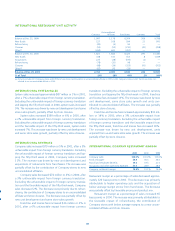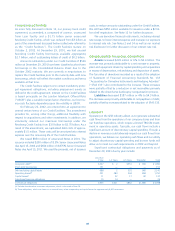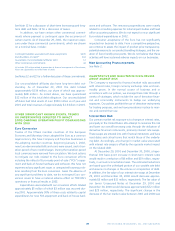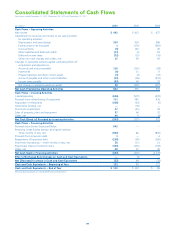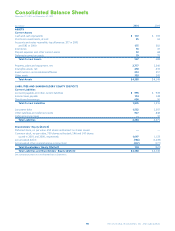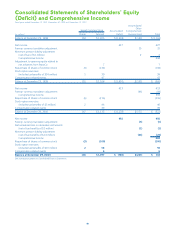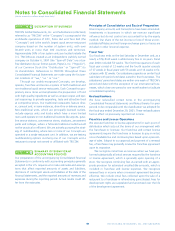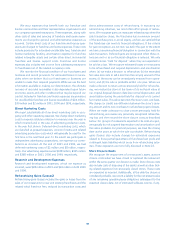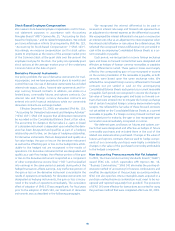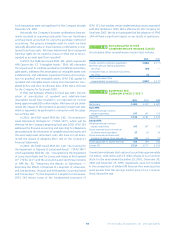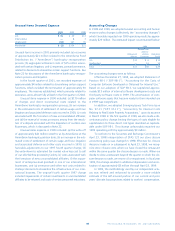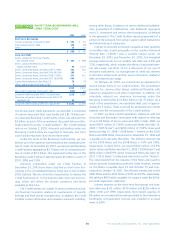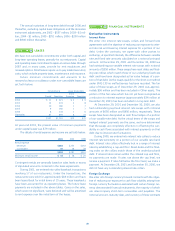Pizza Hut 2001 Annual Report Download - page 44
Download and view the complete annual report
Please find page 44 of the 2001 Pizza Hut annual report below. You can navigate through the pages in the report by either clicking on the pages listed below, or by using the keyword search tool below to find specific information within the annual report.
42 TRICON GLOBAL RESTAURANTS, INC. AND SUBSIDIARIES
DESCRIPTION OF BUSINESS
TRICON Global Restaurants, Inc. and Subsidiaries (collectively
referred to as “TRICON” or the “Company”) is comprised of the
worldwide operations of KFC, Pizza Hut and Taco Bell (the
“Concepts”) and is the world’s largest quick service restaurant
company based on the number of system units, with over
30,000 units in more than 100 countries and territories.
Approximately 36% of our system units are located outside the
U.S. TRICON was created as an independent, publicly owned
company on October 6, 1997 (the “Spin-off Date”) via a tax-
free distribution by our former parent, PepsiCo, Inc. (“PepsiCo”),
of our Common Stock (the “Distribution” or “Spin-off”) to
its shareholders. References to TRICON throughout these
Consolidated Financial Statements are made using the first per-
son notations of “we,” “us “ or “our.”
Through our widely-recognized Concepts, we develop,
operate, franchise and license a system of both traditional and
non-traditional quick service restaurants. Each Concept has pro-
prietary menu items and emphasizes the preparation of food
with high quality ingredients as well as unique recipes and spe-
cial seasonings to provide appealing, tasty and attractive food
at competitive prices. Our traditional restaurants feature dine-
in, carryout and, in some instances, drive-thru or delivery service.
Non-traditional units, which are principally licensed outlets,
include express units and kiosks which have a more limited
menu and operate in non-traditional locations like airports, gaso-
line service stations, convenience stores, stadiums, amusement
parks and colleges, where a full-scale traditional outlet would
not be practical or efficient. We are actively pursuing the strat-
egy of multibranding, where two or more of our Concepts are
operated in a single restaurant unit. In addition, we are testing
multibranding options involving one of our Concepts and a
restaurant concept not owned or affiliated with TRICON.
SUMMARY OF SIGNIFICANT
ACCOUNTING POLICIES
Our preparation of the accompanying Consolidated Financial
Statements in conformity with accounting principles generally
accepted in the U.S. requires us to make estimates and assump-
tions that affect reported amounts of assets and liabilities,
disclosure of contingent assets and liabilities at the date of the
financial statements, and the reported amounts of revenues and
expenses during the reporting period. Actual results could dif-
fer from the estimates.
2
NOTE
1
NOTE
Notes to Consolidated Financial Statements
(tabular amounts in millions, except share data)
Principles of Consolidation and Basis of Preparation
Intercompany accounts and transactions have been eliminated.
Investments in businesses in which we exercise significant
influence but do not control are accounted for by the equity
method. Our share of the net income or loss of those uncon-
solidated affiliates and net foreign exchange gains or losses are
included in other (income) expense.
Fiscal Year
Our fiscal year ends on the last Saturday in December and, as a
result, a fifty-third week is added every five or six years. Fiscal
year 2000 included 53 weeks. The first three quarters of each
fiscal year consist of 12 weeks and the fourth quarter consists
of 17 weeks in fiscal years with 53 weeks and 16 weeks in fis-
cal years with 52 weeks. Our subsidiaries operate on similar fiscal
calendars with period end dates suited to their businesses. The
subsidiaries’ period end dates are within one week of TRICON’s
period end date with the exception of our international busi-
nesses, which close one period or one month earlier to facilitate
consolidated reporting.
Reclassifications
We have reclassified certain items in the accompanying
Consolidated Financial Statements and Notes thereto for prior
periods to be comparable with the classification we adopted for
the fiscal year ended December 29, 2001. These reclassifications
had no effect on previously reported net income.
Franchise and License Operations
We execute franchise or license agreements for each point of
distribution which sets out the terms of our arrangement with
the franchisee or licensee. Our franchise and certain license
agreements require the franchisee or licensee to pay an initial,
non-refundable fee and continuing fees based upon a percent-
age of sales. Subject to our approval and payment of a renewal
fee, a franchisee may generally renew the franchise agreement
upon its expiration.
We recognize initial fees as revenue when we have per-
formed substantially all initial services required by the franchise
or license agreement, which is generally upon opening of a
store. We recognize continuing fees as earned with an appro-
priate provision for estimated uncollectible amounts, which is
included in franchise and license expenses. We recognize
renewal fees in income when a renewal agreement becomes
effective. We include initial fees collected upon the sale of a
restaurant to a franchisee in refranchising gains (losses). Fees for
development rights are capitalized and amortized over the life
of the development agreement.


